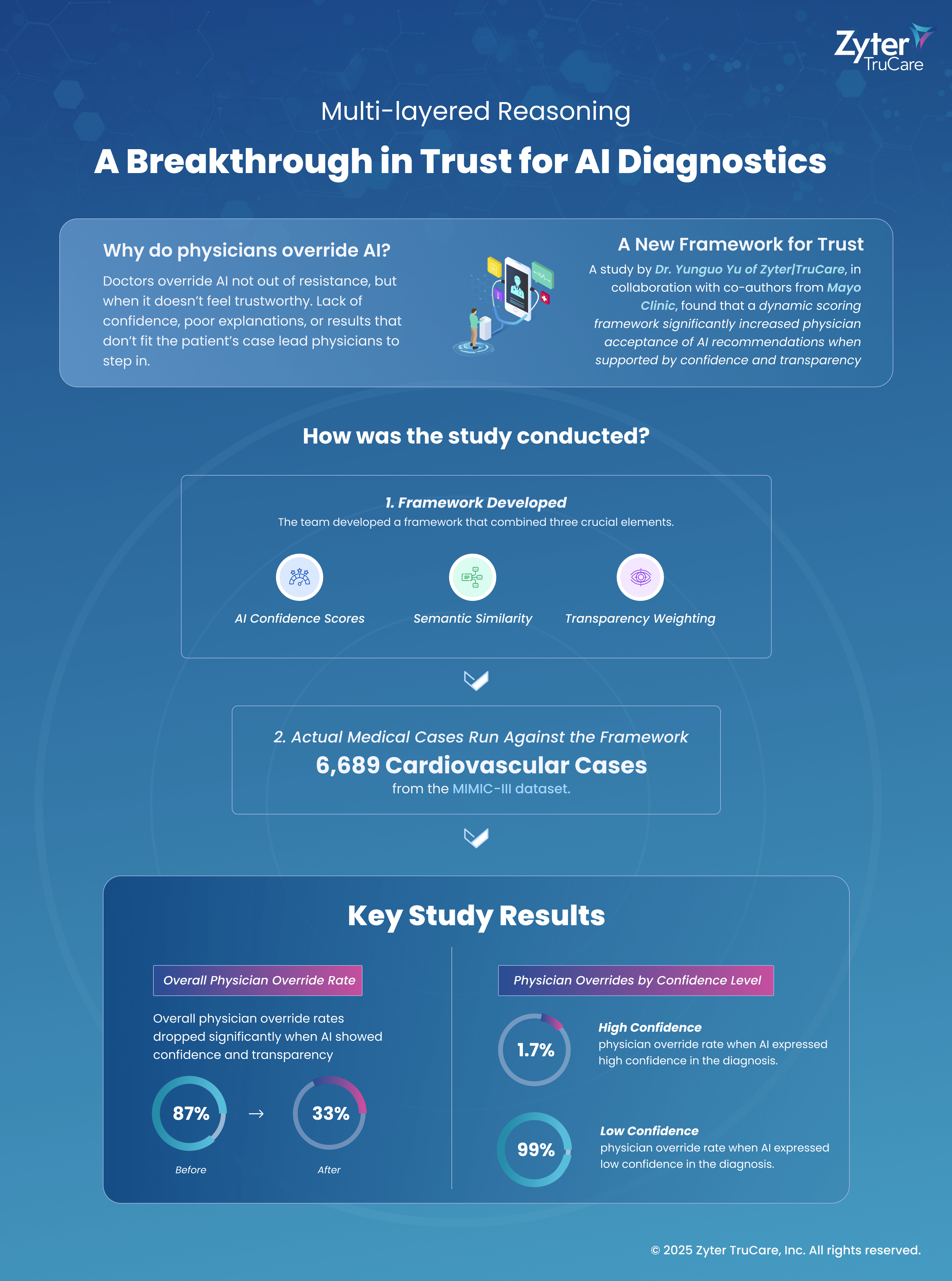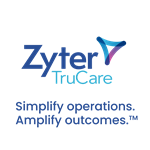First-of-Its-Kind Study Reveals What It Takes for Physicians to Trust AI Diagnostics
New framework with ‘confidence calibration’ helps physicians trust and collaborate with AI programs
Rockville, Maryland, Oct. 14, 2025 (GLOBE NEWSWIRE) -- Zyter|TruCare today announced findings from a landmark, first-of-its-kind study of the interactions between physicians and AI, shedding light on why doctors frequently override AI-informed guidance, and introducing a framework to increase physician trust in AI-generated diagnostic recommendations. Conducted with physicians from one of the nation’s largest integrated, not-for-profit medical group practices, the findings are based on a comprehensive study of 6,689 cardiac disease cases, and are published in the journal Diagnostics, of the Multidisciplinary Digital Publishing Institute (MDPI), a publisher of open-access, peer-reviewed scientific journals: “Enhancing Clinician Trust in AI Diagnostics: A Dynamic Framework for Confidence Calibration and Transparency.”

This work is the first to introduce a practical framework for addressing one of the biggest obstacles to healthcare AI adoption: clinician trust. It emphasizes transparency and adaptability as critical factors for AI adoption in clinical workflows and introduces the novel concept of confidence calibration.
Confidence calibration is vital for ensuring AI reliability in clinical settings, as AI systems that are poorly calibrated may either overestimate or underestimate their diagnostic accuracy, resulting in misdiagnoses, unnecessary medical interventions, or overlooked critical conditions, the study found. In simple terms, offering an explanation of how an AI assistant reached a decision is often not enough to gain a physician’s trust. AI tools must express how confident they are in their diagnostic recommendations.
When the new framework was introduced, it drove overall physician overrides of AI diagnostic recommendations down from 87% to 33%. For instances where the AI was “highly confident” in its recommendation, physician overrides of the AI diagnosis fell to just 1.7%. Statistical analyses confirmed significant associations between confidence, transparency, and override rates.
“These results challenge the claims of many AI vendors, who say their explainable AI programs will quickly earn the clinician’s trust. We have found that explainability is not enough. Physicians need to understand exactly how confident an AI program is when making a recommendation, and we propose a framework for creating this necessary confidence calibration.” said Dr. Yunguo Yu, who designed and led the study and serves as Zyter|TruCare’s Vice President of AI Innovation & Prototyping.
Dr. Yu continues: “Our framework acts like a filter. It looks at the AI’s output and asks three simple questions: How sure is the AI? How clearly does it explain its decision? And how close is it to what the doctor already knows? Only if the answer checks out across all three does the AI’s
recommendation go forward. Otherwise, the framework pushes it back to the clinician for review. This way, doctors see AI as a helpful partner rather than a black box.”
According to Dr. Yu, the next step is to test this framework in hospitals and other clinical settings, where physicians will use diagnostic tools with confidence calibration as part of their daily workflows. “The vision,” says Dr. Yu, “is to make this framework a part of every AI decision-support tool—acting as a safety net that balances trust with oversight.”
Link to an infographic of study highlights here.
About Zyter|TruCare
Zyter|TruCare is a leader in healthcare workflow modernization and population health technology. Its platform supports over 44 million covered lives across more than 45 health plans, delivering NCQA pre-certified, HITRUST-certified, and SOC-2 compliant solutions for care management, utilization review, and clinical operations. Through advanced AI, orchestration, and transformation services, Zyter|TruCare helps clients modernize at speed and scale.

Michele Nachum Venture PR michele@venturepr.co Keilani Finley Zyter|TruCare keilani.finley@zyter.com
Legal Disclaimer:
EIN Presswire provides this news content "as is" without warranty of any kind. We do not accept any responsibility or liability for the accuracy, content, images, videos, licenses, completeness, legality, or reliability of the information contained in this article. If you have any complaints or copyright issues related to this article, kindly contact the author above.

